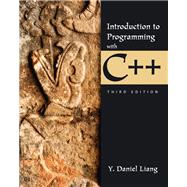MyProgrammingLab should only be purchased when required by an instructor.
For undergraduate students in Computer Science and Computer Programming courses or beginning programmers
A solid foundation in the basics of C++ programming will allow readers to create efficient, elegant code ready for any production environment
Learning basic logic and fundamental programming techniques is essential for new programmers to succeed. A distinctive fundamentals-first approach and clear, concise writing style characterize Introduction to Programming with C++, 3/e. Basic programming concepts are introduced on control statements, loops, functions, and arrays before object-oriented programming is discussed. Abstract concepts are carefully and concretely explained using simple, short, and stimulating examples. Explanations are presented in brief segments, with many figures and tables.
NEW! This edition is available with MyProgrammingLab, an innovative online homework and assessment tool. Through the power of practice and immediate personalized feedback, MyProgrammingLab helps students fully grasp the logic, semantics, and syntax of programming.








